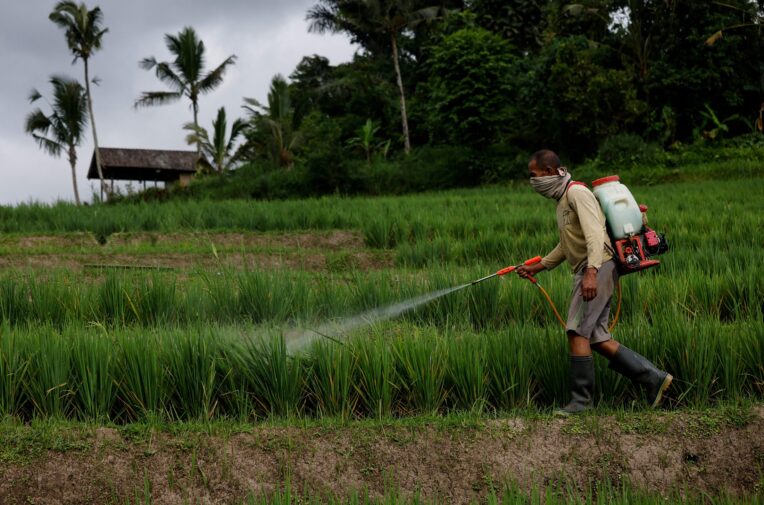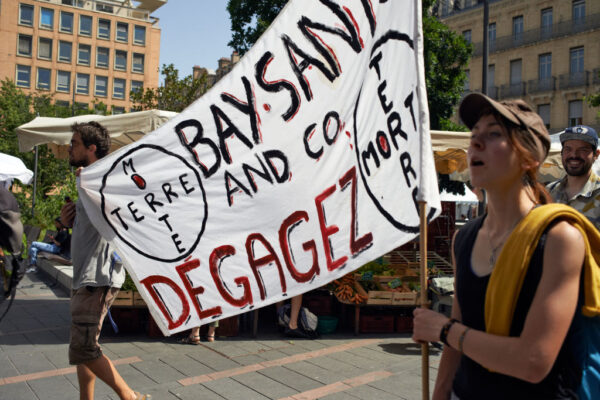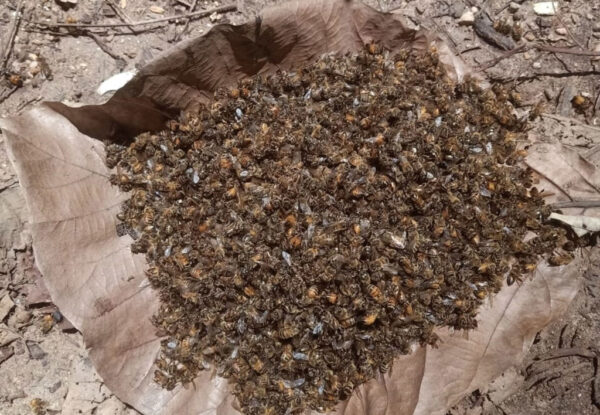
A rice farmer in Bali, Indonesia, sprays pesticides on his crop, October, 2022. France has approved exports of two banned pesticides to Indonesia so far this year. Photo: David Gannon/AFP via Getty
France still exporting prohibited pesticides, despite landmark ban
Loopholes in France’s groundbreaking law to end the export of banned pesticides have kept a trade in toxic chemicals flowing
France still exporting prohibited pesticides, despite landmark ban
Loopholes in France’s groundbreaking law to end the export of banned pesticides have kept a trade in toxic chemicals flowing
A rice farmer in Bali, Indonesia, sprays pesticides on his crop, October, 2022. France has approved exports of two banned pesticides to Indonesia so far this year. Photo: David Gannon/AFP via Getty
The French government has approved the export of more than 7,400 tonnes of banned pesticides so far this year, despite introducing a landmark law intended to prohibit the practice, a new Unearthed and Public Eye investigation has found.
Among these planned exports are 14 different chemicals that have been prohibited from use on farms across the European Union in order to protect human health or the environment.
They include notorious “bee-killing” neonicotinoid insecticides, banned from outdoor use in the EU to protect pollinators. They also include pesticides banned over human health concerns such as endocrine disruption and damage to DNA, and environmental concerns such as groundwater contamination and toxicity to wildlife.
We must ensure the purpose of this law is respected and it is extended to all of Europe as soon as possible
The shipments were approved despite the French government passing a landmark law – the first of its kind in Europe – prohibiting the manufacturing and export of pesticides containing active ingredients that are banned in the EU. This law, known as the loi Egalim, came into force on 1 January this year.
However, Unearthed and Public Eye, a Swiss NGO, have identified major loopholes in the law and its implementing regulations. These are allowing manufacturers to continue exporting large quantities of banned pesticides from France.
The investigation obtained documents under freedom of information laws, which show that between January and September this year France approved 155 different exports of banned pesticides, with a combined weight of 7,475 tonnes.
Around three-quarters of those exports by weight were destined for low- or middle-income countries – including Brazil, Mexico, India and Algeria – where regulation tends to be weaker, and experts say the use of highly hazardous pesticides poses the greatest risks.
The French Green MEP Michèle Rivasi told Unearthed and Public Eye she was “scandalised” by the findings of the investigation.
France, she said, had been a “pioneer” in banning the export of pesticides containing banned chemicals. But the exports identified by this investigation were a “circumvention” of a law that had been intended “to put an end to this shameful practice, which is at the heart of human rights violations and environmental disasters outside the European Union”.
She added: “This report is important, because it shows that the pesticide lobby is ready to do anything to make a profit at the expense of people and the environment. We must ensure the purpose of this law is respected and that it is extended to all of Europe as soon as possible.”
Unearthed and Public Eye found that, although the new law has not ended French banned pesticide exports, approvals for export from France so far this year are down nearly three-quarters compared with the full year 2021.
The investigation also found that some multinational agrochemical companies have shifted some banned chemical exports to other EU countries, apparently in response to the French ban.
A spokesperson for the French environment ministry argued that the Egalim law had both restricted the export of banned pesticides from France, and acted as a catalyst for reform across the EU.
“French law has made it possible to initiate a change in practice,” she told Unearthed and Public Eye. “Since 1 January 2022, it is no longer possible to export [crop protection] products from France containing substances that have been subject to a non-approval decision at the European level.
“The debates which took place in France also made it possible to initiate discussions in other European countries.” She pointed out that in the past year ministers in both Belgium and Germany had made commitments to end some or all exports of banned pesticides. She added: “A very positive dynamic has been set in motion on this subject and France has been one of the forerunners.”
The news comes at a time when national bans such as the one enacted in France are expected to assume increased importance, after plans for an EU-wide ban were thrown into jeopardy.
The European Commission had promised to present proposals next year to end all banned chemical exports from the EU. However, the plan was dropped from the Commission’s work plan for 2023 at a late stage, under apparent pressure from the chemicals lobby.

High risk
Possibly the biggest loophole in the French ban is in the framing of the law itself: it prohibits the manufacture and export of “crop protection products” containing active chemicals that have been banned in the EU – but it does not prohibit the manufacture and export of the banned chemicals themselves.
This leaves manufacturers free to continue manufacturing and exporting these banned chemicals in large quantities – in their pure form – from France. They can then be diluted and mixed with other ingredients in the importing country to produce ready-to-use pesticides.
When there is a conflict between big companies and the health of people in poorer countries, there is always a way to bypass the laws
Unearthed and Public Eye identified several banned pesticides that seem to have slipped through this loophole.
The most significant of these is picoxystrobin, a fungicide which was banned in the EU in 2017 because of concerns that its residue could cause chromosome damage in humans, as well as the “high risk” it poses to aquatic life, earthworms, and some mammals.
So far in 2022, the French authorities have approved the export of 2,926 tonnes of pure picoxystrobin by the multinational pesticide giant Corteva, making this chemical by far the biggest banned pesticide export out of France this year. The vast majority of that picoxystrobin was destined for Brazil.
“When we think about European Union countries, we have an idea of an environment where regulation is strong and established laws are correctly observed,” said Alan Tegel, spokesperson for the Permanent Campaign Against Pesticides and for Life, a Brazilian umbrella group of social movements and NGOs. “In cases like this, however, we find out that when there is a conflict between big companies and the health of people in poorer countries, there is always a way to bypass the laws and benefit the profit of these companies.”
The second loophole identified by Unearthed and Public Eye is in a decree issued in March this year, which sets out how the Egalim law should be implemented. Under this decree, the export ban does not immediately apply in cases where a pesticide’s approval for use in the EU has simply been allowed to expire without a formal ban. This applies even where the EU authorities themselves consider the pesticide to be banned.
In these cases, the export of the products can only be prohibited through an explicit joint order issued by the French ministers of agriculture and the environment. No such orders have yet been issued.
Under this loophole, the French authorities have so far in 2022 approved the export of more than 1,800 tonnes of products containing the banned “bee killing” insecticides imidacloprid, clothianidin, thiamethoxam, and fipronil, to destinations including Japan, Ukraine, Guatemala and South Africa.
Most of these insecticides are now considered banned at EU level, although they were not subject to a formal ban decision. In 2018, the EU voted to ban all outdoor use of these chemicals to protect bees and other pollinators, but at the time their use in greenhouses was not prohibited. Eventually, their authorisation for these uses expired, and manufacturers have not applied to have it renewed. They are now classified as banned under EU rules.

Groundwater contamination
Unearthed and Public Eye also found a number of exports of banned pesticides that were approved by France this year even though they do not fit through either of the loopholes we identified.
The most significant of these is the fungicide fenamidone, which by volume is the second largest banned pesticide export approved by France this year.
So far this year, France has approved more than 1,400 tonnes of exports containing fenamidone, to countries including Mexico, Algeria, India and Egypt.
More than 1,300 tonnes of these exports were pre-mixed “crop protection products”, and so not covered by the “pure substance” loophole.
Likewise, fenamidone was banned in the EU in 2018 over concerns about genotoxicity and a “high potential” for groundwater contamination, so it is not covered by the exception for chemicals without a formal ban decision.
Unearthed and Public Eye also identified mixed products that were approved for export despite containing the formally banned active ingredients propisochlor and desmedipham.
A spokesperson for the French environment ministry confirmed that pesticide products containing any of these three ingredients do “fall within the scope” of the export ban imposed by the Egalim law. However, in these cases the exporting companies had provided “supporting documents” justifying why the exports should not fall within the scope of the law; these justifications had been analysed and “deemed admissible”.
It remains unclear what justifications were provided by the manufacturers to secure these approvals.
Syngenta shift
Despite the gaps in the Egalim law, Unearthed and Public Eye found evidence that its introduction has sharply reduced the quantity and number of banned pesticides being exported out of France.
Between January and September 2022, France approved banned pesticide exports totalling 7,475 tonnes, a huge drop compared to the 28,479 tonnes notified by French exporters for the full year 2021.
The investigation also uncovered evidence that some multinational pesticide companies, which have subsidiaries in numerous EU countries, are shifting their banned pesticide exports to other member states in response to the French ban.
The most pronounced example of this is the Swiss-headquartered agrochemical giant Syngenta.
In 2021, Syngenta notified 1,941 tonnes-worth of banned pesticide exports out of France. The bulk of that weight was the banned neonic thiamethoxam, but the company also notified pesticides containing propiconazole, chlorothalonil, diquat, and pymetrozine – all banned chemicals.
By contrast, so far in 2022 the company’s only planned exports of banned pesticides from France are 4.6 tonnes of seeds treated with thiamethoxam.
France supports the adoption of an export ban at European level
Instead, the company has this year begun notifying exports of pymetrozine and chlorothalonil out of Germany, and shifted some propiconazole exports to Germany – notably those destined for Tunisia, Argentina and the UAE – which it previously exported from France.
But the most striking example of this shift is atrazine, a notorious herbicide that has endocrine disrupting effects, and has been linked in scientific studies to breast cancer, prostate cancer, and reproductive and developmental risks to animals and children. Atrazine has been banned in the EU since 2004, but for years Syngenta continued to export the chemical out of the EU from France, under the brand name Primextra Gold.
A previous Unearthed and Public Eye investigation found that in 2018 Syngenta notified exports of 1,119 tonnes of Primextra Gold out of France, to destinations including Ukraine, Sudan, and Azerbaijan. By 2021 these exports had stopped.
However, this year, for the first time, Syngenta has notified exports of Primextra Gold out of Germany – 880 tonnes in total, destined for Ukraine, Sudan, and Azerbaijan.
A spokesperson for the French environment ministry said that one “difficulty” of the Egalim law was that a French ban on the export of a substance out of the EU could be “circumvented by exporting it from another country in the Union”.
“It is therefore necessary for the bans adopted or planned in a few European countries to be generalised to the whole of the European Union,” she continued.
She added: “France supports the adoption of an export ban at European level… France wishes to continue to work with the European Commission to accelerate the implementation of this very important measure of its chemicals strategy.”
Syngenta declined to comment on these figures when approached by Unearthed, but a spokesperson for the company said in a statement that the “safety of Syngenta’s products for people and the environment is very important to us”.
He added: “Producing active ingredients for crop protection is technologically complex. We maintain a global supply chain of ingredients and intermediates needed for our finished products.
“To ensure that our compounds meet our stringent production standards and have the highest quality, we produce in only a few places around the world from where we export to more than 90 countries. Our high-tech production plants in Europe have proven track records of safety and quality and decades of experience.”




